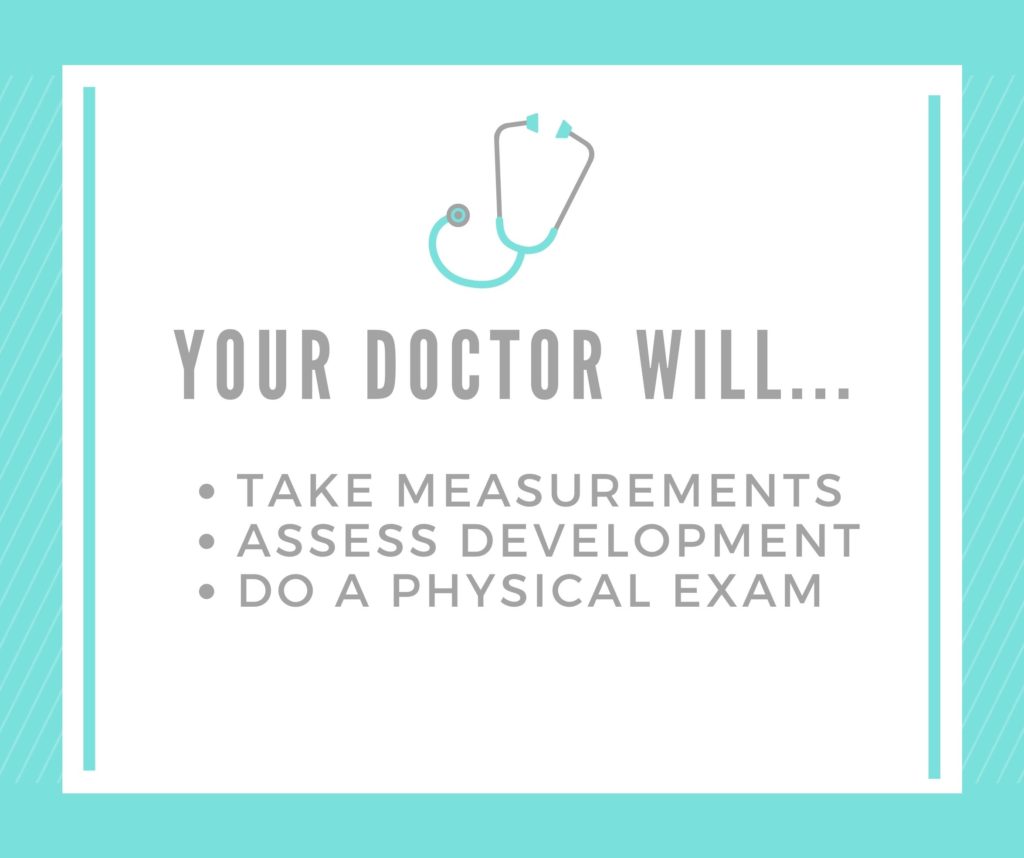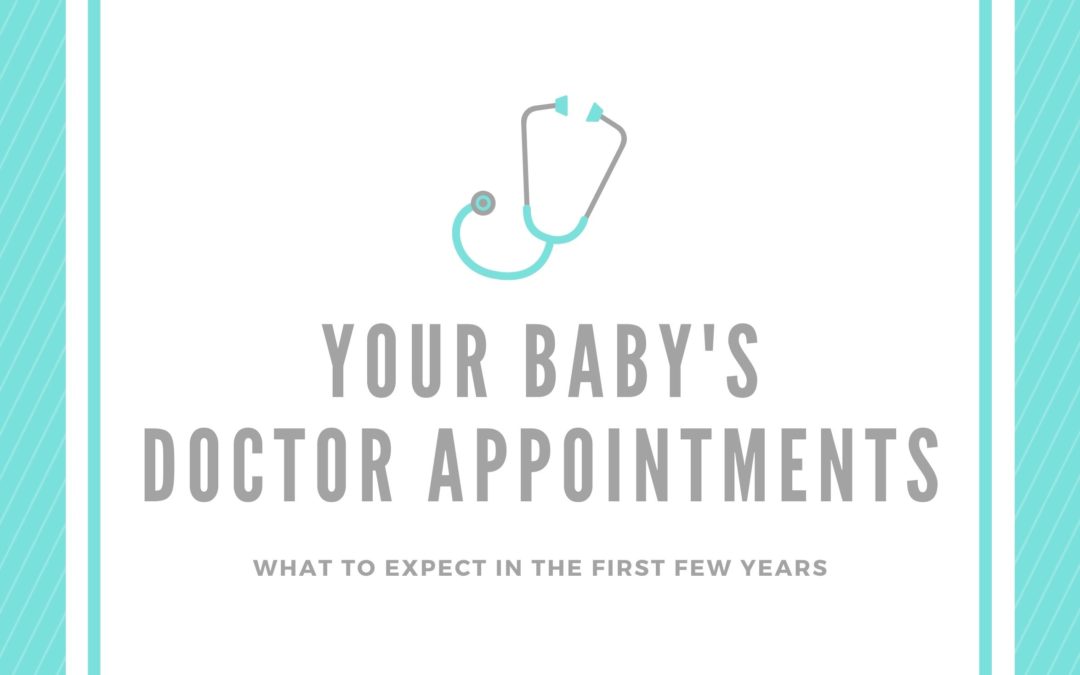How often does my child need to see the doctor during his or her first year? | What should I expect at each visit?
When you bring your bundle of joy into the world, it will be hard to keep your eyes off of your new addition — every little movement and change is exciting. You get to witness baby’s development right before your eyes! No one will know baby better than you, but it’s important to share the details of those wonderful developments and changes with someone else in your baby’s life — baby’s doctor!
Why Are Well-Baby Visits Important?
Taking your newborn to see a pediatrician on a regular basis ensures that your baby is growing and developing healthily and as expected. Well-baby visits also allow for your baby to receive all the necessary vaccinations he or she will need to protect him or her from various illnesses.
During your well-baby visits, you’ll get the opportunity to ask your doctor any questions you might have about your little one’s eating, sleeping, and even his or her pooping patterns. If this is your first baby, you’ll likely have many questions about your newborn’s behavior and growth. The most reliable person to bring these questions to is your baby’s doctor. Don’t be shy; when it comes to making sure your baby is healthy and happy, there’s no such thing as a stupid question.
How Often Should You Take Your Baby to the Doctor?
You probably became accustomed to the frequent doctor’s office visits during your pregnancy – having to go every few weeks to keep track of development, run tests, and prevent or treat any problems that may have occurred during the long months of pregnancy. Once baby is delivered, the same idea applies — you’ll be bringing your little one to the doctor regularly for well-baby visits.
Within the first few days of your newborn’s life, baby should have a visit with a pediatrician for a full exam to check on his body functions and alertness. After that, the American Academy of Pediatrics recommends that you bring your newborn in for well-baby visits at:
- 1 month
- 2 months
- 4 months
- 6 months
- 9 months
- 12 months
- 15 months
- 18 months
- 24 months
While not every doctor will use this exact schedule, doing well-baby visits on a similarly regular basis like this will allow for your doctor to easily notice, treat, and keep track of any problems that might come up in the first two years of your baby’s life.
What Should You Expect At Well-Baby Visits?
Some appointments will be different from others, but for the most part, you can expect your pediatrician to do the following at your well-baby visits:

Take measurements – The doctor will measure your baby’s length, weight, and head circumference to keep track of how he or she is growing.
Assess development – To gauge whether your newborn’s development is on track, your doctor will ask you questions about baby’s milestones such as whether or not baby is rolling over, sitting up, etc. Your doctor will inquire about milestones that are typical for baby’s age range. Your doctor will also want to know about baby’s feeding and sleeping habits.
Do a physical exam – Your doctor will thoroughly check every part of your baby’s little growing body, including the:
- Head, and any soft spots (also known as fontanelles)
- Eyes
- Ears and throat
- Nose and mouth
- Neck and underarms (where the lymph nodes are located)
- Belly
- Heartbeat
- Hips, legs, arms, and back
- Genitals for hernias or undescended testicles
- Skin for birthmarks, rashes, or other irritations
Additionally, at certain well-baby visits, your doctor will want to do some tests and screenings to further understand how your newborn is really doing. These tests might include:
Tuberculosis test – At the 1-month well-baby visit, your doctor might test your baby for TB, an infection that can cause cough, fever, and other problems. The doctor will inject an inactive strain of TB into your baby’s arm. A positive TB result is shown by redness and swelling around the injection site within three days.
Hematocrit or hemoglobin screening – When your baby is 4 months old, his or her doctor will draw blood to check for anemia.
Developmental screening – At the 9-month well-baby visit, your doctor will ask you a series of questions about your newborn’s behavior. Your doctor may also observe your baby as he or she plays or moves around to see if baby is developing basic skills at the appropriate rate for his or her age. If your child is at a higher risk for developmental conditions because of preterm birth or family history, you’ll probably have more frequent developmental screenings.
When Should Your Baby Receive Vaccinations?
Certain diseases are much less common in the world thanks to vaccinations. Making sure your child is up to date on all his or her vaccinations is an easy way to protect him or her as well as other children from potentially life-threatening illnesses. Some parents choose to opt out of vaccinations for numerous reasons, and some children who are immunocrompomised may not be able to safely receive vaccinations. No matter your circumstances and beliefs, your doctor will at the very least, discuss vaccinations and their scheduling with you.
Here is a list of vaccinations your doctor will likely recommend:
Hepatitis B – According to the Centers for Disease Control, the first vaccine your baby will be given is shortly after his or her birth. This will be the first of three doses for the Hepatitis B vaccine. Infants are more likely than adults to develop long-term infections that can harm their organs, so protecting them from Hepatitis B with the vaccination is very important. Baby should receive his or her second dose of the Hepatitis B vaccine at ages 1 to 2 months, and his or her third dose between ages 6 and 18 months.
DTaP – Diphtheria, tetanus, and pertussis are diseases that harm the muscles, lungs, and heart and can all lead to other health problems or death. Your baby will receive his or her DTaP vaccine at ages 2 months, 4 months, 6 months, 15 to 18 months, and 4 to 6 years.
Hib – (Haemophilus influenza type b) Hib is a disease that mostly affects children under the age of 5 and can cause meningitis, pneumonia, and other infections. The CDC recommends every child receive a Hib vaccination at ages 2 months, 4 months, 6 months, and 12 to 15 months.
Polio – A disease that once affected 15,000 people in the U.S. every year, polio can cause permanent paralysis and sometimes death. Children should receive a dose of the polio vaccination at ages 2 months, 4 months, 6 to 18 months, and 4 to 6 years.
PCV – (pneumococcal vaccination) Pneumococcal disease is somewhat common in children but can be particularly deadly for adults. There are two types of pneumococcal disease vaccinations — PVB13 and PPSV23 — and all children should receive a PCV at ages 2 months, 4 months, 6 months, and 12 to 15 months.
Sometimes a child may have a reaction to a specific vaccination. In most cases it just means that your baby is in fact, building up antibodies to the virus the vaccination protects against. But make sure to tell your doctor about any reactions your baby might have to the vaccines, minor or major.
Frequent visits to the doctor can be stressful, and it’s hard to see your little one get his or her first round of shots, but ensuring the wellness of your newborn is your top priority as a parent. Your baby’s doctor has the same priority for baby as well!
Jeri Hoag Photography now empowering and instilling confidence through intimate boudoir photography for the everyday modern woman in St. George, UT/ Hurricane, UT/Washington, UT/Leeds, UT/Ivins, UT/Santa Clara, UT/Dammeron Valley, UT/Veyo, UT/Shivwits, UT/Littlefield, AZ /Las Vegas, NV/Mesquite, NV.

